Based on a manga (comic book) series by Shigemizu Takasaki, Mail (2004) regards a psychic investigator, Reiji Akiba (Takamasa Suga, a pop star rather than actor, & it shows), having a series of short-short encounters with ghosts.
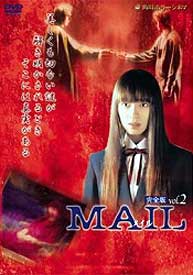 In most of the stories Reiji just shoots the ghosts with a cheap-looking magic handgun called "The Holy Pistol of Kagutsuchi," Kagutsuchi being the Shinto God of Fire, & that's that. In most of the stories Reiji just shoots the ghosts with a cheap-looking magic handgun called "The Holy Pistol of Kagutsuchi," Kagutsuchi being the Shinto God of Fire, & that's that.
The handgun resolutions to each brief episode are so quickly done that there's little time to notice how utterly ineffective the ghost FX are, & assuredly no ounce of suspense.
The individual tales may have made nice comic book panels, I'll never know. But as a film the tales needed to be fleshed out with characterization & some development for suspense & tension, all of which these tales utterly lack on the screen. And never mind that the photography is flat & unimaginative & the acting worse; it's the stories themselves that are just ruinously bad.
The title Mail tries to pull the short-short sequences together with a common theme of e-mail received over Reiji's cell phone, though even that isn't consistent. And in stories scant minutes long apiece, it's absurd that some of the longest scenes consist of looking at the screen of a cell phone, as though phone messages were in & of themselves just oh so thrilling.
I'm convinced the young performers, who've done passable to good work elsewhere, could've done a better job of acting were it possible in the circumstances they found themselves in to do so. So the failure of this thing would seem to fall in the lap of novice screenwriter Hiroto Okajima, who failed to make much of the comic book frames, & a beginner director who failed to get even average performances out of a baby-faced cast lost on their own.
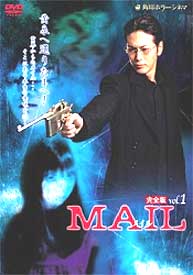 In the ultra-short untitled prologue an entire tale is told in a couple minutes. Horribly bad FX of a creepy little boy ghost snatches a young woman through the wall of her apartment. Reiji Akiba shows up with his magic gun, shoots the wall which kills the ghost, & the captured girl falls out of the wall perfectly all right. In the ultra-short untitled prologue an entire tale is told in a couple minutes. Horribly bad FX of a creepy little boy ghost snatches a young woman through the wall of her apartment. Reiji Akiba shows up with his magic gun, shoots the wall which kills the ghost, & the captured girl falls out of the wall perfectly all right.
We're then immediately treated to the first story proper, called The Painting. It's nearly good enough that it might've gotten by as a filler piece in the old Night Gallery series (1969-1973). But as the best tale of this lot, it's mainly worth of sigh of disappointment.
When the cursed painting of "The Sleeping Girl" opens her eyes, that's the only really cool special effect the film is going to have, simple but appealing. What evil thing she might have done in the past we're never quite told, & what might've happened to the young woman newly witnessing the supernatural event is not developed, as Reiji bursts in on the scene & shoots the ghost.
That's pretty much the whole story, except we're introduced to the character of Mikoto (Chiyaki Kuriyama, who is in reality quite talented though it only slightly shows in this awful telefilm) who had sent Reiji the e-mail that brought him to the residence in the first place.
She knows all about his career as a psychic investigator & ghost-shooter. She's only nineteen years old, but she wants to be his assistant, & though she doesn't do much assisting, she's an ever so slightly more interesting character than Reiji; so, well, I guess it's a good thing she's present.
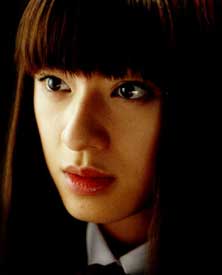 The next tale is called The Reunion. Reiji is on an automobile journey with a young woman who is being called by teenage ghosts to return to the site of a catastrophe. The next tale is called The Reunion. Reiji is on an automobile journey with a young woman who is being called by teenage ghosts to return to the site of a catastrophe.
Her school burnt down on graduation day fifteen years earlier, & she was late arriving, so survived. The ghosts are twinking with her car's electronic map to make her go back to the location of the burnt down school. We are treated to a brief flashback which consists of possibly the worst CGI creation of a building on fire ever to escape the cutting room floor.
As soon as the ghosts of her friends manifest uninterestingly, standing about doing nothing, Reiji is ready to shoot them with his magic gun, sending them to Hell. But a mysterious figure communicates with Reiji psychically telling him not all ghosts are evil.
So too the young woman he travelled with suddenly realizes the ghosts just wanted to give her a graduation send-off & had waited all these years for her return only to complete their celebration of her success.
Now that they've given her their best wishes, they vanish into the proper afterlife. Not the least bit interesting is any of this, though we might wonder about the mysterious psychic communicator who stopped Reiji from just killing the ghosts. This old gent will show up again, but really, who cares.
And then among these increasingly uninteresting tales, we find ourselves very rapidly told the story of The Stalker. A jealous ghost-woman is after the wife of the man the evil ghost had desired in life, but Reiji shoots her & no harm done.
Next up comes the story of Katsumi-san involving a suicide ghost-girl who haunts a warehouse. Reiki shows up in the nick of time to save the newest victim, shooting the ghost with that silly-ass gun, the existence of which insures that nothing original ever happens.
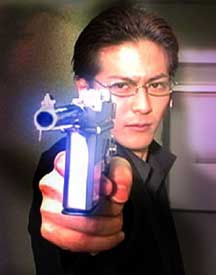 In Boy with Sight & The Promise we get flashbacks to the childhood of Reiji, to learn part of his origins as a ghost-hunter. These two tales are really one continuous tale, & the only part of the film that has any complexity or character development to speak of. In Boy with Sight & The Promise we get flashbacks to the childhood of Reiji, to learn part of his origins as a ghost-hunter. These two tales are really one continuous tale, & the only part of the film that has any complexity or character development to speak of.
Reiji was blind for most of his childhood, but too afraid of the surgical process that might restore his sight. He has psychic abilities & can tell there are ghosts in the world, & he's scared of what he might see if he could see.
He's befriended by a little girl in the children's hospital. She helps him face his fears & have the surgery. It's also a love story which is impossible to take serioiusly since they're such little kids, but it's perhaps a little less silly than the ghosts encountered.
When his sight is restored, he learns that the girl has leukemia & is not expected to live long, though in fact she lives for several years, institutionalized for life, for in this ignorantly constructed world people with leukemia never get to go home.
Reiji is so traumatized to realize that he's in love with a dying girl that he never visits her again. Atta boy, Reiji.
Before they part ways, she makes it clear that she loves him & she makes the titular "promise" that they will meet again. Is that a forshadowing or what.
A curse of sorts falls upon Reiji so that he cannot even remember that he ever met her. If by his psychic abilities he helps 100 people, he'll regain his memory with his hundredth case.
[SPOILER ALERT!] When Reiji finally remembers his childhood love & goes to the hospital to visit her for the first time, he discovers that she only recently died & he has missed his opportunity. He also remembers that she gave him a letter before his sight was restored for him to read when he could see.
Though he'd forgotten the letter existed, he managed even so to keep it close to hand, & finally reads it. Nothing interesting in it, but it's better mail than the e-mails he's had earlier. The surprise is that the day his childhood love died in the hospital, that's when Mikoto showed up to become his detective-assistant. Now that they are reunited & can remember her, she can say goodbye, & disappear, ain't it sad. [END SPOILER ALERT]
There were two more stories for a grand total of nine in the original television mini-series & the two-volume Japanese dvd release set with extras.
The one-volume subtitled version for American release loses the extras & two of the stories. I am not worried that they might've been good stories, so am not unduly upset. Still, as they were only five minutes each, I find it difficult to believe they couldn't've been included, so that this would at least be "the complete awful series" rather than ten minutes deleted.
Although The Painting isn't all bad, & Boy with Sight/The Promise at least has a bit of complexity to it, fact is, it would be vastly more entertaining to see the director dancing naked on the Ginza singing, "I'm a talentless monkey pants! I'm a talentless monkey pants!"
copyright © by Paghat the Ratgirl
|
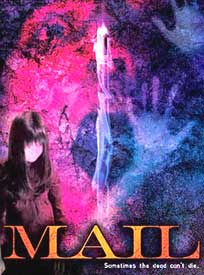
 In most of the stories Reiji just shoots the ghosts with a cheap-looking magic handgun called "The Holy Pistol of Kagutsuchi," Kagutsuchi being the Shinto God of Fire, & that's that.
In most of the stories Reiji just shoots the ghosts with a cheap-looking magic handgun called "The Holy Pistol of Kagutsuchi," Kagutsuchi being the Shinto God of Fire, & that's that.

